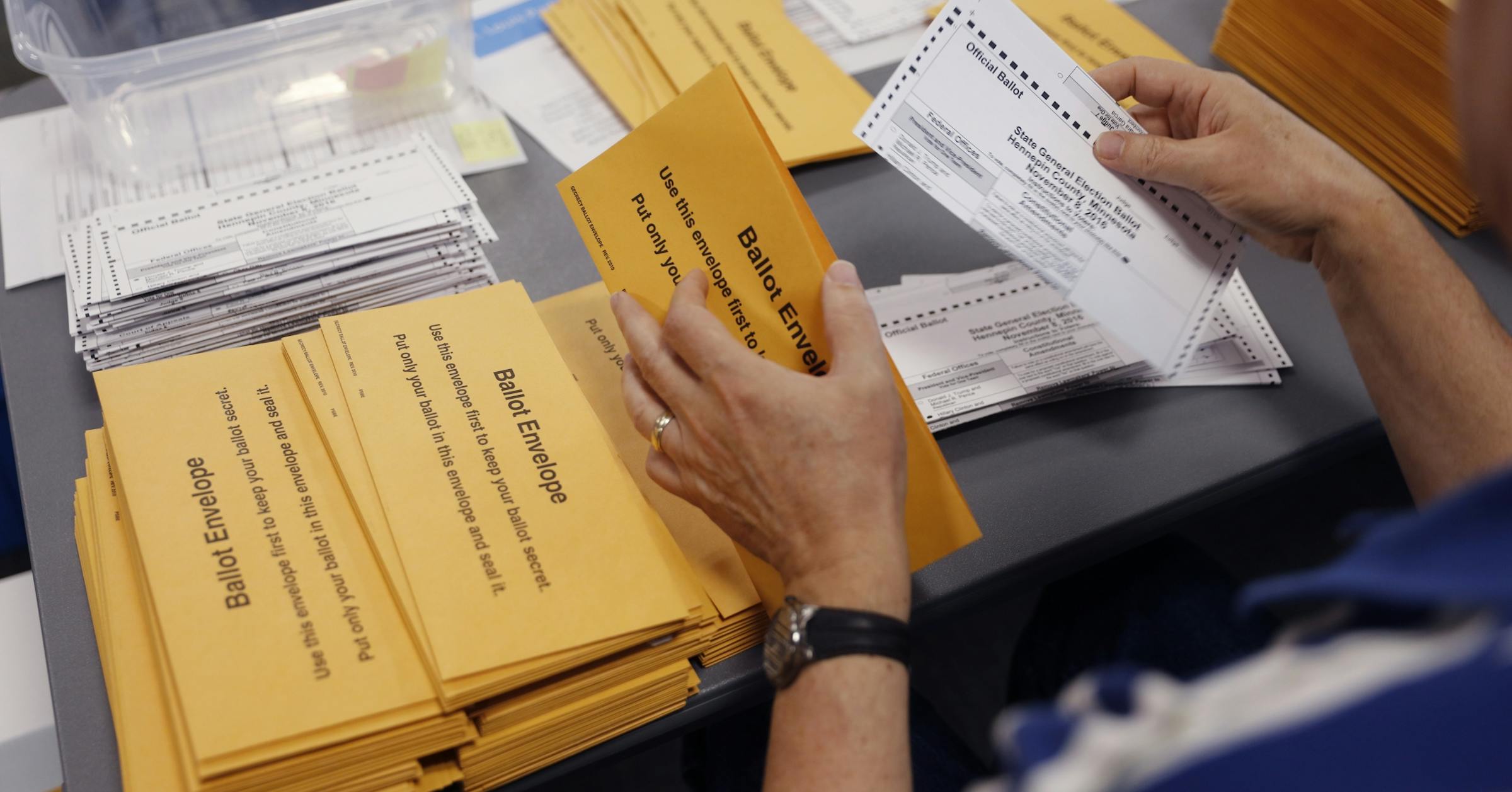Star Tribune
Food program oversight strengthened as state returns to pre-pandemic rules

Oversight of federal child nutrition programs is intensifying in Minnesota again as the state returns to pre-pandemic rules for feeding needy children.
While that is welcome news to many longtime nonprofit meal providers, several said they also worry the allegations of a $250 million food fraud scandal will spur new regulations that could make it more difficult for legitimate organizations to distribute food to low-income children.
“In general, it’s more difficult to bring on new sites now because of the extra oversight and due diligence … justifiably,” said Marcus Pope, president of Youthprise, a Minneapolis nonprofit that’s participated in nutrition programs since 2015. “We recognize that there will be additional scrutiny but the scrutiny shouldn’t be at the level it prevents people who have done the work well from being able to continue to do the work.”
Federal waivers loosened rules and oversight when COVID-19 first arrived. Regulators with the Minnesota Department of Education (MDE), which administers the federal program, reduced in-person visits to examine meal distribution, for instance. And meals could be sent home instead of requiring children to eat at a dining site. The more lax rules opened the door to the fraud scheme that federal prosecutors say is the largest pandemic-related fraud in the country.
Those waivers all ended by June 30, returning the state to more rigorous pre-pandemic rules.
Now, nonprofit leaders say, the programs will likely “self-correct” from the high numbers of meals reported during the pandemic. Setting aside the alleged fraud, legitimate organizations were serving more meals during the pandemic because schools were closed and families could pick up multiple meals at once, nonprofit leaders said.
The return to pre-pandemic rules is already slowing down approval of new sites and preventing some organizations from participating, providers said.
Officials from MDE declined an interview request for this article.
To try to dispense food quickly and safely amid the pandemic and school closures, the U.S. Department of Agriculture (USDA), which funds the programs, granted Minnesota more than 100 waivers. The waivers let for-profit restaurants participate and allowed distributors to give to-go or packaged meals that families could make at home instead of the pre-pandemic model of dishing out hot meals in dining sites. Some in-person monitoring requirements were also lifted, reducing visits by sponsoring agencies and MDE.
“It was just, in my opinion, a perfect storm,” said Christa DeBoer, Youthprise’s nutrition program director. “People potentially took advantage of that while the rest of us focused on serving the communities.”
Over three summer months, providers across Minnesota claimed to serve 37 million meals in 2021, up from 3.5 million meals the summer of 2019.
Ellie Lucas, CEO of Hunger Impact Partners, a statewide advocacy group, said COVID and the economy weren’t enough to drive up such explosive growth.
“The numbers indicated that [the state was] feeding more children than existed,” she said.
Federal prosecutors say that defendants associated with Feeding Our Future inflated their meal counts and submitted fraudulent invoices, making up names of children on attendance rosters. They say co-conspirators created shell companies to launder the money, traded kickbacks and bribes, and used the scheme to get rich, paying for goods such as Porsches and luxury homes.
Feeding Our Future leader Aimee Bock has denied any wrongdoing and some of the 49 people charged so far have also pleaded not guilty. Prosecutors have called it the first set of charges in a continuing investigation.
The return to pre-pandemic rules means hot meals need to be served to kids in congregate dining.
Longstanding Minneapolis nonprofit Loaves & Fishes decided to keep serving to-go meals this summer because clients preferred it, said executive director Cathy Maes, but that meant that when the waivers ended, the nonprofit wasn’t eligible for about $50,000 in federal money.
Most of Feeding Our Future’s former sites have also been sidelined. Prosecutors haven’t alleged that all of Feeding Our Future’s sites were fraudulently operated, saying in indictments that some sites did purchase and serve a small amount of food.
According to MDE, just 13 of Feeding Our Future’s more than 100 sites have signed on with a new sponsor so far, most through Edina-based Provider’s Choice.
Meal sites can either apply through MDE to be self-sponsored or contract with a sponsoring agency to oversee the complicated paperwork and reimbursements.
Fardowsa Ali worked with Feeding Our Future during the pandemic and applied to be her own sponsor, but she said MDE rejected her twice. She said she’s still feeding children at Hooyo Child Care Center in Minneapolis, but without any federal reimbursements she has to pay for the meals herself.
“They are not helping us,” she said of MDE. “We tried to apply and they rejected our application. We applied again and they gave us a bunch of really difficult things to do.”
MDE has referred former Feeding Our Future sites to Youthprise and other nonprofits and school districts.
Several of Feeding Our Future’s former sites have also contacted Youthprise looking for a new sponsor. But unlike Feeding Our Future, Pope said Youthprise provides food to sites so it can have more control over quality and compliance. Pope said once some inquiring sites learned that, they stopped the application process.
“You have a lot of sites that are just in limbo right now because of everything that’s going on,” he added. “There are some legit sites that are challenged by this. But there are some sites that didn’t do right. … We want to serve the community and we want to serve sites, but we don’t want to work with folks who haven’t done right by the system.”
Youthprise’s vendor, CKC Good Food, operates a sprawling 42,000-square-foot warehouse and office building in Eagan. Nancy Close started CKC more than three decades ago after her Afghan restaurant in St. Paul kept getting requests to provide meals to child care centers and schools. Now, she said her business prepares more than 17,000 meals a day for more than 150 schools and nonprofits.
“There’s no money in it. You make pennies on it,” Close said.
The USDA sets reimbursement rates and nutrition guidelines, for instance, stipulating how much protein, calories and sodium every meal must have.
Some nonprofits now fear the Feeding Our Future scandal will decrease trust in nonprofits and add regulations. Minnesota is one of seven states where the state agency doesn’t have administrative rulemaking authority. The Legislature would have to sign off on any policy changes.
Lucas of Hunger Impact Partners is pushing for changes, including limiting the number of sites under a newly formed sponsor and streamlining record-keeping. She said there’s a fine line between overregulation and rooting out fraud.
“The most important thing,” she said, “is that the people operating the federal programs are operating with integrity so the meals get to the children who deserve them.”
Staff writer Jeffrey Meitrodt contributed to this report.
Star Tribune
Eagan parents of college runner who died by suicide settles suit with her coach and school
The Eagan parents of a college runner who died by suicide has settled their lawsuit that alleged their daughter’s cross-country coach at the time tormented her with demeaning comments in emails and texts about her weight and learning challenges.
The lawsuit was filed in U.S. District Court in Florida in June 2023 by Ray and Lynne Pernsteiner, the parents of Julia Pernsteiner, 23, who died in her Jacksonville University dorm room on Nov. 8, 2021. Her death came two months after the coach kicked her off the team, the suit contended.
The lawsuit named as defendants the university and former cross-country coach Ronald E. Grigg Jr., who coached women’s track and cross-country at the Division I school from 1998 until his sudden resignation in July.
The family’s attorney, Robert Spohrer, said that the case went to mediation, and there was “an amicable resolution of all issues” that led to the suit’s dismissal.
Spohrer said a strict confidentiality agreement among the parties prevented him from disclosing terms of the settlement.
Attorneys for Grigg and the university did not respond to messages left by the Star Tribune.
Messages were left Thursday with the law firms representing the school and Grigg. The defendants have yet to file any response in federal court to the allegations. The university said in a statement that it does not comment on pending litigation.
The suit contended that Pernsteiner’s constitutional rights were violated under the Americans with Disabilities Act and under Title IX because of discriminatory acts based on her gender.
Star Tribune
Hennepin County incorrectly appointed election judges

The state Republican Party and conservative legal groups filed a petition with the Minnesota Supreme Court on Wednesday claiming that Hennepin County did not appoint partisan election judges in the right way.
The party and two conservative groups, the Upper Midwest Law Center and the Minnesota Voters Alliance, want to know how Hennepin County appointed election judges to its absentee ballot board this year. The board’s work includes making sure signatures on absentee ballots match signatures on voter registration cards and deciding if a ballot is spoiled or not.
The central question of the lawsuit, according to Andy Cilek, executive director of the Minnesota Voters Alliance, is whether county elections officials have to exhaust lists of potential election judges provided by the political parties before selecting others for the absentee ballot boards, which are required to have a balance of Republican and Democratic election judges.
“We want to understand how this occurred,” said Minnesota Republican Party Chair David Hann.
The suit alleges no one from a list of 1,500 Republicans supplied by the state Republican party to the Secretary of State’s office were selected by Hennepin County. Hann said he did not know if any Republicans were selected to serve.
Ryan Wilson of the Upper Midwest Law Center said the group has not scrutinized lists of election judges in other counties to make sure they included names provided by the state Republican Party. Wilson said his group is focusing on Hennepin County because it has the most voters, and the most potential to have an impact, he said.
In a statement, Daniel Rogan, Hennepin County auditor, said absentee ballot board members were appointed in compliance with state law and guidance from the Secretary of State.
Star Tribune
Funeral date set for 13 year old boy run over at Minnesota haunted hayride

Funeral services for Alexander “Xander” Steven Mick will take place Monday at Discovery Church in Sauk Rapids beginning at 2 p.m.
The boy was injured Saturday after being run over by a wagon pulled by a tractor at the haunted hayride Harvest of Horror.
Xander was a unique child who loved Jesus with all his heart, said his mother, Teri Dahlberg Mick, in a statement.
“He was full of life, a junior black belt in taekwondo, played drums for worship team; he was in band, sang in choir, in robotics and soccer, and almost was an Eagle Scout,” she said.




GIPHY App Key not set. Please check settings